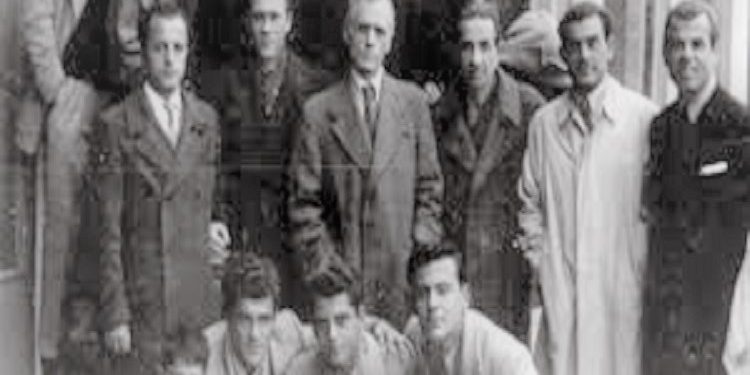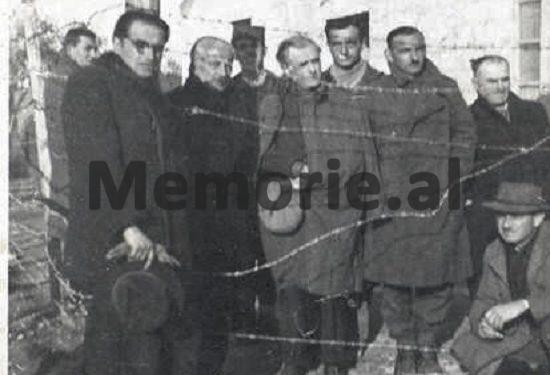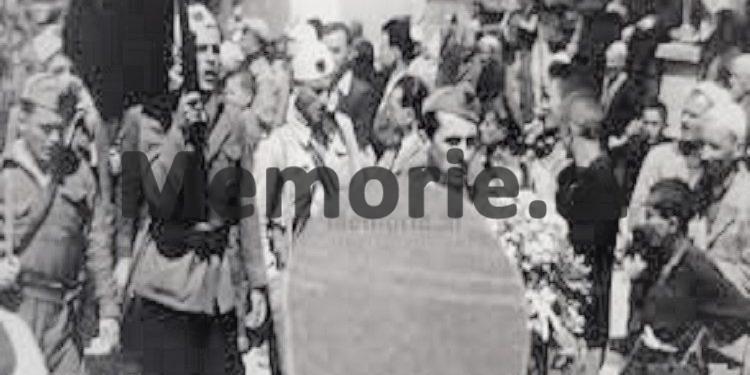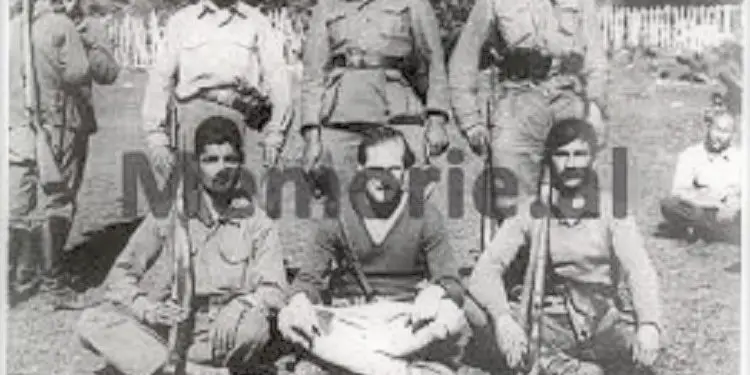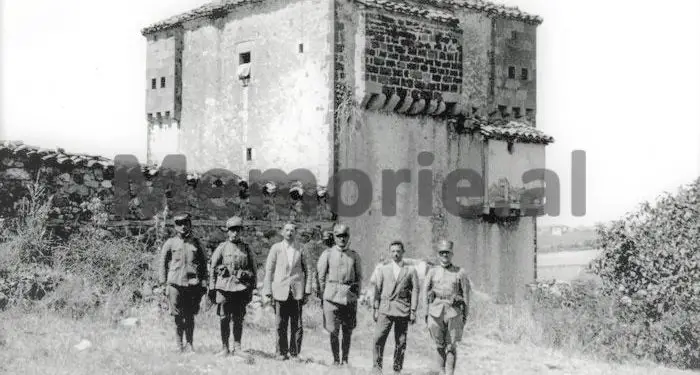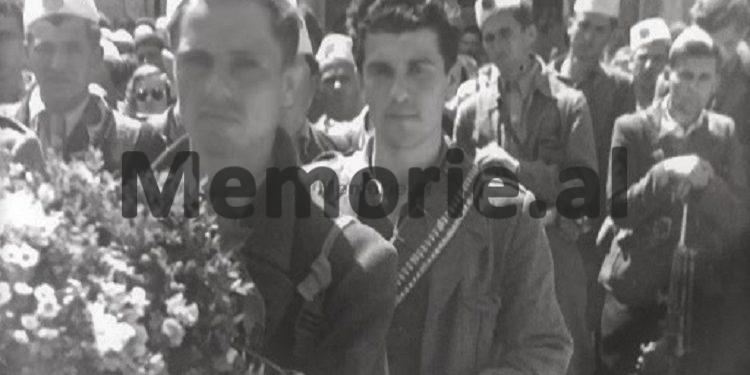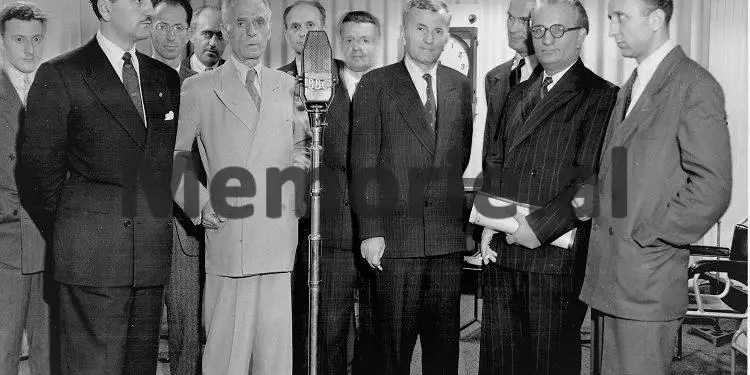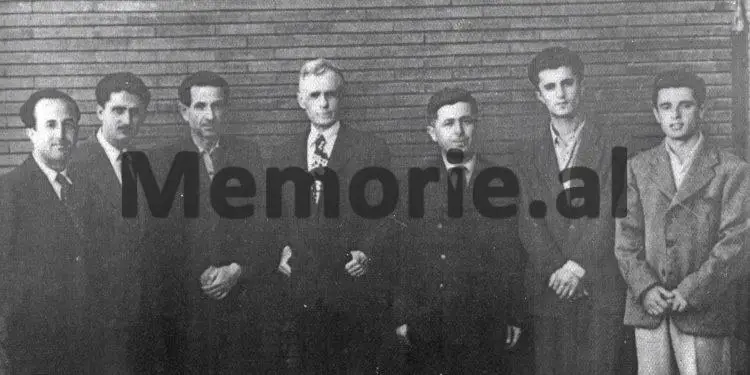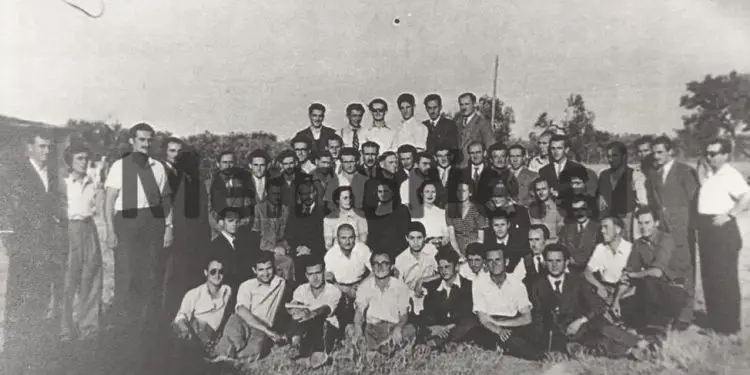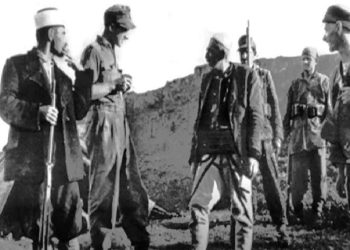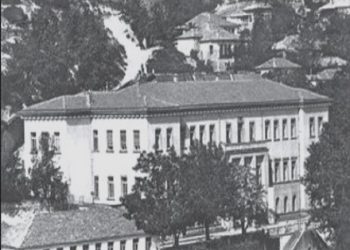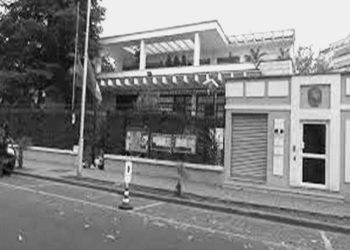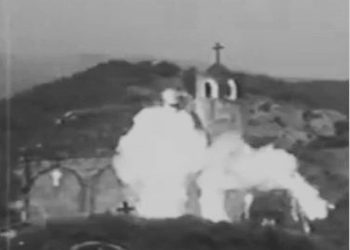Dashnor Kaloçi
Second part
Memorie.al/ publishes the unknown story of the main leaders of the nationalist organization ‘Balli Kombëtar’ and ‘Legaliteti’, who in the late autumn of 1944, after realizing that Enver Hoxha’s partisans had won the war and taken power of them was already a matter of days, initially gathered in the Castle of Preza, where after holding a meeting chaired by Abaz Kupi and Mit’hat Frashëri, they decided to leave Albania and from there marched towards the city of Shkodra, where after many debates and negotiations with the leadership of that city, led by Gjon Markajoni and Hasan Isufi, who tried to prevent them, with the help of German forces and the son of Mehdi Frashëri, were able to cross the state border and travel to in the direction of Bar, where the ship of Sulejman Latifi, originally from Shkodra, was waiting for them, which was taken by 10 napoleons of gold to each of the 250 “passengers” who boarded there, to then travel to the shores of Italy isë. The sad story of the main leaders of ‘Balli’ and Legality ‘at the end of 1944, comes through the testimony of Arif Peza, one of the main exponents of the Youth of’ Balli Kombëtar ‘who in June 1944, at the head of a gang who was in command, had gone to Kosovo to fight against Draraza Mihailovi çet’s Chetnik forces. How did Kupi leave Albania with Frashri and their main collaborators, who after staying for three or four years in the camps of Italy, which had been opened by the Anglo-Americans, some of them gained political asylum and were scattered in different countries of the world, as: USA, Australia, Argentina, Brazil etc., while the rest who remained there, went to Egypt, where with the intervention of King Zog at King Farouk, who still knew the government of the Zog Monarchy, were provided with passports by the consulate Albanians in Cairo and dispersed to Syria and various Arab states.
Upon arrival in the city of Shkodra, the main leaders of the nationalist organization of the ‘National Front’, Mithat Frashëri, Hasan Dosti, Vasil Andoni, etc., were received in a house that had been their base during the war. Ballista and legalists who arrived in the city of Shkodra, were divided into two “camps”, where Mit’hat Frashëri, Hasan Dosti, Ali Këlcyra, Vasil Andoni, Faik Quku, Kadri Cakrani, etc., wanted to leave in the direction of Italy by boat, while the rest with Halim Begena, Mexhit Xhaferi (Dibra), Bardhyl Borshi, Mustafa Maloku, Halil Balla, Kasem Alimehmeti, etc., wanted to continue further north of the Dalmatian coast, to leave for Croatia, with destination Austria and Germany. Frashëri, Dosti, Këlcyra, Andoni, Quku, Cakrani, Peshkëpia, etc., who decided to leave for Italy, compiled a list of people who would leave, where each of them would pay 10 gold napoleons to Sulejman Latifi, the owner of the ship (Ulcinj resident who lived in Shkodra), who would pick them up when they arrived at the port of Bar ”. This is how Arif Peza, a former exponent of the Youth of Ballit Kombëtar and at the same time commander of a ballista gang, which in 1944, went to Kosovo, to fight against the Chetnik forces of Draza Mihailovi.. After being able to leave Albania, together with the main leaders of ‘Balli’ and ‘Legality’ at the end of November ’44, Arif Peza settled in Canada, where he lived as a political emigrant until the fall of the communist regime. Enver Hoxha and returned to Albania in 1993. From the testimonies of Mr. Arif Peza, (who until he passed away in 2007, lived in Tirana with his granddaughter, Mira Qazim Peza), mainly those for the period of occupation of the country (1939-1944), is mentioned in this article, where he told for the sad fate of the main leaders of the nationalist forces of ‘Balli’ and ‘Legality’, who at the end of ’44, were forced to leave Albania, to escape the revenge of Enver Hoxha’s partisans!
Continued from the previous issue
Arrival of ballistas and zogists in Brindisi
The nationalist leaders could not believe their eyes when they saw in the port quays people armed with the red star uniform of the Yugoslav partisans of Josif Broz Tito. But that was not what they remembered, as the gunmen were indeed Yugoslav partisans of Marshal Tito, but as representatives of the Yugoslav mission, near the Allied Mediterranean Command based in Bari, who had their office in the port of Brindisi. As soon as the ship with the Albanian political emigrant docked at the port pier where it was towed by the British mission ship, accompanied by some Allied soldiers, they all went down one by one checking them, except for the women and children who did not stop tell nothing. All immigrants, ballistas and legalists, after superficial physical control, then underwent questioning procedures by Anglo-American officers. Their questions were different, but mostly they wanted to know why they had left Albania and what their intentions were. These procedures again saved women and children. After that, they put them in covered trucks and sent them to a building that once served as a school for children, which they had adapted as a camp for receiving immigrants. This school, where all members of the nationalist forces were stationed, was not far from the port of Brindisi where they first landed.
At the Grumo camp
At that building, the men separated the women and children and gave them all food packages. The next day, at the school building where the Albanian emigrants spent the first night in foreign lands, the Allied forces arrived and took them all to be sent to the Grumo camp. In the same camp, along with the Albanians were sent 20 Italian soldiers who had traveled with them from the city of Shkodra. The 5 Serb Chetniks separated them and sent them to a camp in the city of Bari. In the Grumo camp, all Albanian emigrants were washed, cleaned and provided with two blankets, which they would have to sleep on. Arif Peza, one of those emigrants who was also one of the main leaders of the Balli Kombëtar Youth, recalled that in the Grumo camp, the conditions were very bad and they put them all in a big tent, where the sleeping was on the ground in the middle of mud. Likewise that camp was fenced and guarded by armed soldiers who did not allow any of the immigrants to leave. For three or four days in a row, two British officers came to the camp to interrogate Mit’hat Frashëri and Ali Këlcyra, who were known more than others for their past as senior politicians of the Balli Kombëtar organization. Less than five days after the arrival of the Albanian emigrants on the Italian shores, on November 28, there in the camp of Grumos, everyone gathered to celebrate the Flag Day, which was also the National Day of Albania. In those improvised ceremonies, Mit’hat Frashëri and Zef Pali (exponent of Balli) from Shkodra took the floor. During the speech they held, behind them stood almost, with the red and black flag in hand, Luan Dosti, one of the young people of Balli, who were the son of the well-known lawyer Hasan Dosti. During those days in the Grumo camp, the leader of the ‘National Front’, Mithat Frashëri, was constantly interested in the whereabouts of his close friend Major Abaz Kupi. For Bazin he had no information since the day they were separated in the castle of Preza, after the joint attack that their forces made on the German convoy. Frashëri wanted to meet Kup, as he had high hopes for him, knowing the sympathy that the Anglo-Americans enjoyed for him.
Communists meet ballists!
After spending a week in the Grumo camp, the Albanian political emigrants were ordered to prepare because they would be transferred to the Bari camp. After getting them all on the trucks, they arrived at the Bari camp, where conditions were much better than in Grumo. The camp command occasionally gave political immigrants permission to leave the city of Bari, according to their needs. In this regard, Arif Peza recalled that one of his ballistic friends, named Ali Tremishti (from Përmeti) asked for permission first and went out into the city. He met one of his old comrades, Skënder Malindin, who had been the commander of the Skrapar partisan squads and after being seriously wounded in the war, was taken by the Allied Forces to be treated at the Bar hospital. The ballistae’s meetings with their former opponents, Enver Hoxha’s partisans, did not end with Malindi. After a few days in the Bari camp, Captain Nuri Huta, who was a partisan and a member of the delegation of the Albanian Military Mission, led by Colonel Kadri Hoxha, who was accredited by the Command of the Allied Mediterranean Forces, went to visit. Captain Nuri Huta, in the Bari camp, met and held talks with Mit’hat Frashëri and Vasil Andoni, for whom he had a special sympathy since he had been a professor in the high school of Tirana.
In Santa Maria De Leuca
In mid-January 1945, after Albanian political emigrants had stayed in the Bari camp, they were informed that they were about to be transferred to the Santa Maria de Leucas camp. This camp was located at the southernmost point of the Apennine Peninsula (at the end of the ‘boot heel’) and was like a tourist village, where the emigrants settled in very good condition houses and villas, which were prepared for the forces of the Forces. Allies, but were rejected by them. All the political emigrants were sent to that camp, with the exception of Mit’hat Frashëri, Vasil Andoni and the ship owner Sulejman Latifi, who were arrested before leaving the Bari camp. None of the Albanian emigrants learned the truth of their detention. They were only told that they would be sent to a camp other than that of De Leucas. In that camp, which was the southernmost point of the Apennines, the Albanian emigrants stayed in very good conditions until the end of August 1945, when they were informed that they would change their place again, to send them to Reggio Emilia. During those eight months, other Albanians fleeing Albania began to come to that camp to escape the persecution of the communists, who had begun a savage terror, with murders, imprisonments and internments against their former opponents. .
In Reggio-Emilia
In the Reggio-Emilia camp, Albanian political emigrants settled in a building that had been erected for the “Caza Balila”. Even in this camp, living conditions like accommodation and food were very good, like in that of Santa De Leucas. A few days after their arrival at that camp, all the emigrants were overjoyed when they saw Mit’hat Frashëri and Vasil Andoni and Sulejman Latifi, who had been arrested in Bari. After a few days, the Albanian emigrants were divided into two groups. One group in which the leaders of Balli participated: Mit’hat Frashëri, Vasil Andoni, Hasan Dosti, Faik Quku, and their followers Rushdi Daca, Emin Kopliku, Teki Xhindi, etc., as well as the legalists: Sali Myftija, Mul Bajraktari, Selim Damani, Zydi Karagjozi, Sadik Shaska, Arif Peza, Hysen Prishtina, etc., were kept there in the camp of Reggio Emilia. Along with them, in that camp, stayed some of the leaders of the “Independent Bloc”, who had later arrived in the Italian camps, such as: Tahir Kolgjini, Munir Tërshana, Man Kukaleshi, Mehmet Bej Olltuni, etc. The other group that was sent to the Barleta camp included: Xhemal Laçi, Ago Agaj, Irfan Ohri, Jahja Mancaku, Asllan Mersini, Hamza Drini, Dule Sevrani, Akil Derhani, Mexhit Xhaferi, etc. Towards the end of 1946, in the Reggio-Emilia camp, where other political emigrants fleeing from Albania continued to arrive, a large amount of humanitarian aid arrived in food and clothing which had been sent by King Zog from Egypt. Regarding this, Arif Peza recalled: “The packages sent to us by King Zog were not only for us political emigrants, but were there for all Albanians who were in Italy. After their arrival, many other Albanians from different cities of Italy came to our camp, mainly students who were supplied with them “.
From Italy to Damascus
The political emigrants who were in the Reggio Emilia camp remained there until the end of 1947. From time to time many of them were transferred to the Bagnoli camp, which was a transit country, and from there, after gaining political asylum; they were dispersed to different places of the world, such as: America, Canada, Australia, Brazil, Venezuela, etc. This was achieved because the Albanian emigrants, mainly young boys, were interested in the embassies of those countries that were accredited in Italy. The emigration of Albanians from Italy around the world continued until 1948, when a large part of them who were in the Bagnoli camp sought to go to Syria. To go to Syria, the Albanian political emigrants were assisted by Mrs. Mirvete Sula, who was the consul of the Kingdom of Albania in Egypt, as King Farouk of Egypt, still knew the government in exile of King Zog, whom he had sheltered with his family in a luxury villa in Alexandria. Ms. Sula issued visas to the passports of the Kingdom of Albania, which were still held by many of the political emigrants, and through various bodies of the High Commissioner for Refugees, it became possible to pay for a steamer, which took them from the port of Naples to in Syria. Among the emigrants who went to the Arab state, were: Arif Peza, Neshat Kolonja, Jahja Mancaku, Mul Bajraktari, Isa Manastirliu, Hamza Drini, Xhelal Bushati, Mato Murati, Hafuz Azemi, Daut Azemi, Haki Omari, Reshat Bicaku, Dervish Bicaku, Sadik Mollasi. Together with this emigrant, the Lady of the former Albanian Foreign Minister, Mehmet Konica, went to Syria with her two daughters, Lavdien and Merushen. The Albanian political diaspora was warmly received in Damascus and was personally taken care of by the Head of State Shykëri Kuatli, who was a close friend of King Zog. With his interest, all Albanians settled and were given social assistance by the state. At first, the Albanian emigrants settled in Damascus, in some rooms near the Sultan Selim mosque, while the family members returned home in good conditions. After that, many of the immigrants who wanted to work settled in different jobs. In Damascus, Shefqet Gavoçi, the son of Sulejman Gavoçi from Shkodra, was also interested in Albanian emigrants, who had a special order from King Zog to take care of them. After the Italian group, the group of Kosovars arrived in Damascus with Xhafer Deva, Xhelal Mitrovica, Tahir Zajmi, Rexhep Krasniqi, Rauf Maliqi, etc., who were also housed in separate houses.
Zog’s call and the distribution of the Albanian political diaspora!
The group of Albanian emigrants from Syria stayed there until August 1949, and then dispersed to the USA, Canada, Australia, etc. Of the emigrants who remained in Italy, only a small part of them stayed there, while the rest were scattered around the world. The leaders of the ‘National Front’, Mit’hat Frashëri, Hasan Dosti, Vasil Andoni, and some of their successors, approved your request and went to the USA. At the beginning of 1948, King Zog summoned to Egypt, all the main leaders of the Albanian political diaspora who were scattered in different parts of the world. His former opponents, such as Mustafa Merlika Kruja and some leaders of the ‘National Front’, also responded to this call, but only Mithat Frashëri was absent. Among other things, in his speech, Zogu told them: “If you want to save Albania from the clutches of communism, come and gather everyone and create a government in exile. I will support you without reservation. “After the King’s words, Abaz Kupi ran to New York, to persuade Mit’hat Frashëri to come and meet Zog. The next day of that day that Kupi arranged his passport, Frashëri was found dead in his room. After that, the Albanian political diaspora was separated from the various conflicts that had started long ago between them, (creating several different committees and parties), which had started from the period of the War and unfortunately would continue until the collapse of the communist regime of Enver Hoxha. Memorie.al




